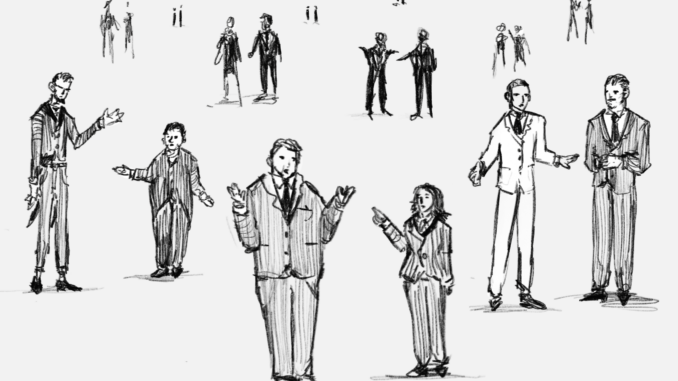
Do debates matter? I know, I know, a preposterous question to be sure. The presidential debate has long stood at the forefront of American politics. This has been the case going back to the days of the famed Lincoln-Douglas debates, when a lowly Illinois congressman named Abraham Lincoln intellectually dueled Illinois Sen. Stephen Douglas in the lead-up to the state’s 1858 Senate election. The two men hosted a series of five debates over two months, with up to 50,000 people attending in total. They sparred over the hot topics of the time: tariffs, Western expansion and slavery. The Lincoln-Douglas debates were the first formal political debates in American history, and created an expectation of what these debates were meant to be. In the American consciousness, a debate was meant to be a genuine and spirited conversation on the issues — but is that what they are today?
In 1960, presidential candidates Richard Nixon and John F. Kennedy faced off in the first presidential debate that was available to both television and radio audiences. And what were the results? Well, it is widely understood that those who listened on the radio thought Nixon was victorious. However, when millions of television viewers saw Nixon — who came off as short and sweaty — juxtaposed with the handsome glow of Kennedy, they regarded Kennedy as the victor. The people who simply listened to the candidates were able to make clear sense of the positions, while those who watched were blinded by debonair. Because what is the presidential debate really, if not good TV?
This theme of charm over content, presented in the very first televised debate, has been a constant ever since. In 1980, no one wanted to listen to Jimmy Carter weigh the pros and cons of national health care; they wanted to stare at the pearly grin of Ronald Reagan, the movie star. In 1992, no one wanted to listen to George H.W. Bush talk about free trade; they wanted to hear the smooth, sax-playing Bill Clinton (known colloquially as Slick Willy), who they had seen on “The Arsenio Hall Show.” In 2016, no one cared about Hillary Clinton’s decades in public service; they cared about the reality T.V. star who was in “Home Alone 2: Lost in New York.” The presidential debate is, simply, good TV. And no one does TV like Americans.
Even as I tuned into the latest presidential debate this week between former President Trump and Vice President Harris, the moments I saw “doing the rounds” on social media were of Trump’s laughable comments on transgenvder operations on illegal immigrants in prison or pet-eating residents of Springfield, Ohio. The online reactions to the debate felt more like a “101 Funniest Moments” compilation than an engagement with the country’s candidates and policies.
These observations on the theater of American politics are not particularly unique. In fact, some inspiration for this piece comes from an interview with astrophysicist Neil deGrasse Tyson, and businessman Patrick Bet-David. In the interview with Bet-David, Tyson asserted that usually, the perceived winner of a debate is whoever has more charisma.
“If it’s a pure matter of opinion, then a person should just simply have their opinion. If it’s a matter of objective truths, there should be no debate,” said Tyson. While I personally see nothing wrong with discussion or argument on matters of opinion, Tyson’s point still resonated with me. If it is all about charisma or stage presence, and not the facts, then why do these debates matter in the first place?
Leah Gilbert, Associate Professor of Political Science and Department Chair, weighed in on the issue.
“They have an impact,” Gilbert wrote via email. “Measuring how much of an impact can be difficult. This is because it can be challenging to isolate the impact of the debate from other factors that can influence people’s vote like partisanship or other features of the campaign.”
This inability to measure their importance gets to the heart of my issue with debates.
While it is undeniable that debate performances impact the polls, so do many things. It is common for candidates to receive an immediate bump in polls following their party’s conventions. Even so, polls almost always narrow heading into November. The inability to measure the direct impact of these debates begs the question: Are debate results just another bump on the road to the election?
The real reason debates continue to be held is people believe that we ought to be able to talk to one another; that we as Americans need to be able to communicate through our differences. This harkens to a simpler day when debates were respectful, where Nixon and Kennedy could say they respected each other. This is not the political reality of today. That being said, as long as this idea of talking to one another permeates the American conscience, the debate will remain a fixture of politics. But even now, debates mean less than they did in the past; they are weaker. If this were not the case, Trump could not so easily refuse to attend a follow-up debate with Harris.
As I conclude this piece, I find myself drawn to a headline I read in the morning, before this week’s presidential debate. The headline, from The Hill, asks, “Will the Debate Matter?” Before ultimately concluding with the matter-of-fact response that I too have come to: “Probably Not!”

Leave a Reply